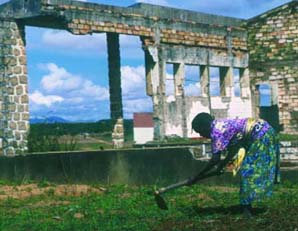FAO AND OTHER AGENCIES have adopted a development approach that places the concerns and experiences of both men and women as an integral dimension of the design, implementation, monitoring and evaluation of emergency and rehabilitation policies and programmes so that they can benefit equally, and inequality is not perpetuated.
FAO's gender policy is described in its Gender and Development Plan of Action (2002-2007) which focuses on promoting gender equality in four key areas: access to food, access to natural resources and agricultural support services, access to policy and decision-making processes, and access to on- and off-farm employment. FAO and WFP produced some joint Guidelines and a Passport to Mainstreaming a gender perspective in emergency and rehabilitation programmes under the SEAGA Programme. www.fao.org/sd/dim_pe1/pe1_040701_en.htm www.fao.org/reliefoperations/common/ecg/41707_ en_Passport_Seaga.pdf
Generating and sharing information on progress and impacts, and ongoing needs, with all involved parties is essential for a comprehensive view of the overall interventions, for the coordination between donors, NGOs, governments and local beneficiaries, and the achievement of sustainable longer-term rehabilitation and recovery.
REGIONAL GENDER ADVISER
In many post-conflict countries, particularly in sub-Saharan Africa, both gender inequalities and the AIDS epidemic are factors that undermine nutrition and household food security, and consequently require special attention in policies, programming and strategies adopted in emergency operations. For this reason, FAO recruited an HIV/AIDS and Gender Adviser to assist its Regional Emergency Office in Nairobi with planning and implementing a gender programme with a focus on strengthening collaboration in the sub region.
Source FAO, 2004c.
